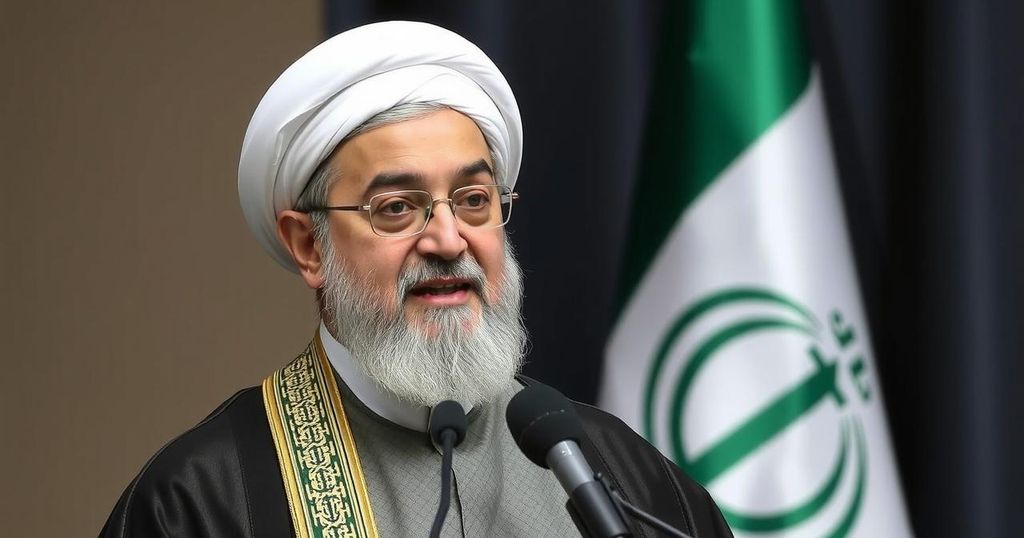Khamenei Blames US-Israel for Assad’s Ouster, Vows Strengthened Resistance
Ayatollah Ali Khamenei accused the US and Israel of conspiring to topple Bashar al-Assad, attributing responsibility for Syria’s instability to these nations and unnamed neighboring states. He claimed that Iranian intelligence had warned Syria about threats, which were ignored, yet he maintained that Iran’s influence would not wane. Khamenei framed increased external pressures as a catalyst for stronger resistance in the region.
In a significant address given in Tehran, Iran’s Supreme Leader Ayatollah Ali Khamenei explicitly characterized the recent ousting of former Syrian President Bashar al-Assad as a coordinated effort orchestrated by the United States and Israel. He suggested that these powers, along with an unnamed neighboring country, played a crucial role in destabilizing Syria and emphasized the continuous threat posed to the region’s stability by external forces. Khamenei stated, “There should be no doubt that what happened in Syria was the result of a joint American-Zionist plot.” He criticized the Syrian government for failing to heed Iranian warnings about potential threats over the past months, insisting that such intelligence had been neglected. Despite the significant political shift in Syria, Khamenei contended that Iran’s influence would not diminish, asserting that resistance would emerge even stronger.
Khamenei’s remarks come amidst a backdrop of geopolitical tension in the Middle East, where the political landscape has been increasingly shaped by civil conflict within Syria since the onset of war in 2011. An array of neighbors surrounds Syria, including Iraq, Israel, Jordan, Lebanon, and Turkiye, each possessing varying degrees of involvement in supporting opposing factions within the country. Khamenei’s insinuations regarding a neighboring nation involved in the plot, potentially aimed at Turkiye, highlight the complexity of regional alliances and rivalries that have expanded since the war’s eruption.
Moreover, Khamenei sought to downplay fears that Iran’s position would be eroded by the events transpiring in Syria. Asserting that the Iranian response to external pressures would yield an intensified resistance movement, he stated, “The more pressure you apply, the stronger it becomes; the more crimes you commit, the more motivated it becomes; the more you fight them, the more expanded it becomes.” This rhetoric aligns with Iran’s long-term strategic outlook of maintaining a united front against perceived Western imperialism in the region.
In conclusion, Khamenei’s denunciation of the US-Israel collaboration in Syria reflects Iran’s steadfast resolve to uphold its influence despite shifting dynamics in the region. His unyielding conviction that increased adversity translates to a strengthened opposition underlines the prevailing ideology within Iran’s leadership, suggesting a commitment to continuing support for the Syrian government, regardless of changing political circumstances.
The commentary presented by Iran’s Supreme Leader Ayatollah Khamenei regarding the ouster of Bashar al-Assad is situated within a broader context of Middle Eastern geopolitics. Since the start of Syria’s civil war in 2011, the country has found itself at the center of regional and international conflict, with various nations supporting different factions. Iran, alongside Russia, has provided essential military and logistical backing to the al-Assad regime, seeing its stability as crucial for maintaining their influence in the region, particularly in countering US and Israeli presence. The dynamics of power have been further complicated by the roles played by neighboring countries, particularly Turkiye, which has historically supported opposition groups against al-Assad.
In summary, Ayatollah Khamenei’s statements regarding the fall of Bashar al-Assad articulate Iran’s unwavering stance against external interventions and the perceived threats posed by the US and Israel. The assertion that these events stem from a deliberate conspiracy is indicative of Iran’s broader strategy to consolidate its influence in the region. Khamenei’s comments reinforce the sentiment that Iran will continue to fortify its commitments to Syria, suggesting an expectation of resilience in the face of foreign pressures, which he believes will only galvanize regional resistance movements.
Original Source: www.aljazeera.com




Post Comment